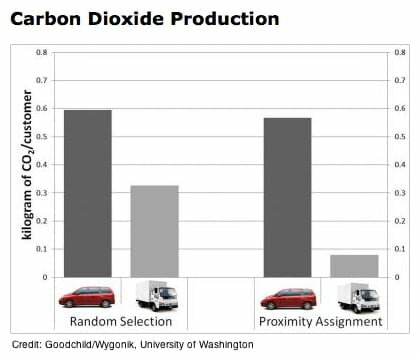 Grocery deliver services — such as those offered by Amazon, Safeway, FreshDirect and Google — can cut carbon dioxide emissions by 20 to 75 percent compared with individual household trips to the store, according to University of Washington researchers.
Grocery deliver services — such as those offered by Amazon, Safeway, FreshDirect and Google — can cut carbon dioxide emissions by 20 to 75 percent compared with individual household trips to the store, according to University of Washington researchers.
The study, published in the Journal of the Transportation Research Forum, also discovered significant transportation savings for companies — 80 to 90 percent less CO2 emitted — if they delivered based on routes that clustered customers together, instead of catering to individual household requests for specific delivery times.
As companies continue to weigh the costs and benefits of offering a delivery service, UW engineers looked at whether using a grocery delivery service was better for the environment, with Seattle as a test case. The research was funded by the Oregon Department of Transportation.
Researchers compiled Seattle and King County data, assuming that every household was a possible delivery-service customer. Then, they randomly drew a portion of those households from that data to identify customers and assign them to their closest grocery store. This allowed them to reach across the entire city, without bias toward factors such as demographics and income level.
They used an EPA modeling tool to calculate emissions. Using factors such as vehicle type, speed and roadway type, they calculated the CO2 produced for every mile for every vehicle.
Emissions reductions were seen across both the densest parts and more suburban areas of Seattle. This suggests that grocery delivery in rural areas could lower CO2 production.
Last week East Coast parcel carrier LaserShip joined the EPA’s SmartWay Transport Partnership, a program that reduces transportation-related emissions by creating incentives to improve supply chain fuel efficiency. The program has helped partners — including Coca-Cola Enterprises, Nike, UPS, Home Depot, and other freight shippers, truck carriers, rail carriers, logistics companies and multi-modal carriers — slash fuel costs by more than $6.5 billion since 2004, reducing foreign oil imports by 55 million barrels, the EPA says.
Chart Credit: Goodchild/Wygonik, University of Washington